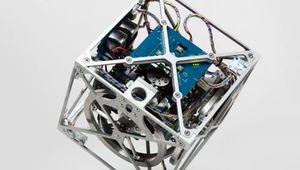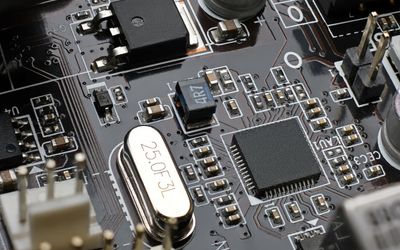Silicon Labs xG24 Explorer Kit
A low-cost development platform for 2.4GHz IoT devices powered by the Gecko SoC.
Technical Specifications
| SoC | EFR32MG24 Wireless Gecko System-on-Chip (EFR32MG24B210F1536IM48) |
| Processor | 32-bit ARM Cortex-M33 (78MHz max) |
| Memory | 256 |
| Storage | 1536 |
| Wireless connectivity | 2.4 |
| I/O interfaces | 1x USB Type-C port (debug and power), 1x Qwiic connector, 1x mikroBUS socket, 20x breakout pads (2.54mm pitch) |
| User interface | 2x LEDs, 1x Reset button, 2x Push buttons |
| Debugger | Onboard USB J-Link debugger, Packet Trace Interface (PTI) |
| Power | 5V via USB, 3.3V LDO |
| Dimensions | 35.6 x 55.9mm |
| Supported software | Simplicity Studio |
Overview
The Silicon Labs xG24 Explorer Kit is a low-cost embedded platform built around the firm’s wireless Gecko System-on-Chip (SoC). Designed as a small form factor evaluation platform for rapid prototyping of Internet-of-Things (IoT) applications, the kit includes a range of hardware and software tools that make it easy to get started with Zigbee development. The kit includes an xG24 wireless microcontroller, a 2.4 GHz antenna, and a USB debugging interface.
A Low-Cost IoT Prototyping Platform
The xG24 Explorer Kit is designed to help developers build and test Zigbee 3.0 applications using the versatile Silicon Labs xG24 wireless SoC, which incorporates AI capabilities to optimize power consumption for IoT applications. The xG24 Explorer Kit also includes a range of software tools and resources to help developers prototype wireless IoT applications for multiple 2.4GHz wireless protocols including Bluetooth LE, Bluetooth mesh, Zigbee, Thread, and Matter.
The Explorer Kit can be used to prototype IoT applications ranging from gateways and hubs to sensors, switches, door locks, and wireless lighting solutions. The modular nature of the kit allows it to be paired with additional sensor modules to enable location services, predictive maintenance, glass break detection, and wake-word detection.
AI-powered Wireless Gecko SoC
Based on EFR32MG24 wireless SoC, the Silicon Labs xG24 Explorer Kit is powered by an ARM Cortex-M33 processor operating at clock speeds of up to 78MHz. The AI-powered SoC features 1.5MB of flash and up to 256KB of RAM to accommodate complicated projects. The onboard AI computation capability allows developers to potentially save battery capacity by performing AI operations locally to transmit results, instead of expending energy to move large amounts of data for cloud-based AI processing.
The Explorer Kit’s wireless Gecko SoC is well-suited for a variety of Zigbee-based applications, thanks to its low power consumption, high data rates, and long-range communication capabilities. The prevalence of Zigbee 3.0 protocol in a wide range of smart home and connected devices makes this development platform a versatile option for rapid prototyping.
Connectivity and Features
In terms of connectivity options, the development board incorporates a mikroBUS socket, one Qwiic connector, and a SEGGER J-Link onboard debugger. The PCB also features 20 breakout pads providing easy access to popular communications interfaces, such as UART, SPI, I2C, and GPIO pins. The onboard Qwiic connector further expands I2C connectivity by allowing additional hardware to be connected using the interface.
In addition to Zigbee 3.0, the xG24 Explorer Kit is capable of mesh IoT wireless connectivity using Matter, OpenThread, and Zigbee protocols for a variety of applications spanning smart home devices and sophisticated medical solutions. The latter category of IoT applications can leverage the platform's PSA Certification Level 3 security enabled by the Secure Vault feature, which is advertised to provide protection from local and remote cyber-attacks.
The xG24 Explorer Kit also supports the Green Power protocol, which is designed for use in low-power, battery-powered devices. The onboard EFR32MG24 wireless Gecko SoC has a sleep current of just 1.3 µA and a receive (Rx) current of 5.1 mA, which helps to extend battery life.
Where to find it

Mouser Electronics
Mouser Electronics is a worldwide leading authorized distributor of semiconductors and electronic components.
References
Recommended Specs
Continue Reading
Microcontroller programming is a vital skill in the realm of embedded systems development. This article aims to provide an in-depth guide to microcontroller programming and covers popular platforms, programming languages, tools, and techniques. By gaining proficiency in microcontroller programming, you can design and develop various embedded systems and create innovative solutions to real-world problems. The guide broadens your knowledge and practical experience in microcontroller programming.









